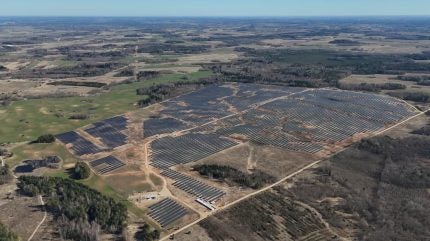
Danish solar energy company Nordic Solar has secured non-recourse project finance of several million euros from Swedbank for its second solar park, currently under construction in Lithuania.
Located in Švenčionys, 80km north of Vilnius, the new solar park is nearing completion.
With a production capacity of 80 megawatts peak (MWp), it will be connected to the grid in spring 2025, providing solar power to more than 35,000 Lithuanian households.
In 2024, Nordic Solar commissioned Lithuania’s first large solar park to date in Molètai, with a production capacity of 100MWp.
The new financing agreement follows a previous agreement between the two entities for this project.
Swedbank Lithuania member of the board and head of corporate customer division Ignas Mačeika stated: “Our continued partnership with Nordic Solar and the funding provided for its second solar park enables the rapid transformation of Lithuanian energy system towards a future based on renewables.
“Lithuania’s strategic goal is to have 100% locally produced electricity by 2030, while projects such as large solar parks bring that goal even closer.”
The financing for the Švenčionys solar park is being disbursed ahead of the completion of construction, serving as a non-recourse construction financing solution.
Nordic Solar chief investment officer Tim Janusch Gadatsch stated: “This is a solid financing solution that we have entered into with Swedbank, and it reflects how attractive this project is. Nordic Solar is pleased to contribute to strengthening Lithuania’s renewable energy production, which is high on the agenda in the country.
“A strong collaboration based on a shared vision is crucial for us to realise more solar energy projects in the country, and here again we have greatly appreciated the collaboration with Swedbank. This is not only an attractive financing solution, but an attractive opportunity to collaborate across borders to strengthen Lithuania’s ability to increase the share of solar energy in the energy mix and strengthen the energy supply in line with the country’s ambitious national targets.”
The new solar park will be constructed using Nordic Solar’s proprietary steel substructure, which has been granted a European patent.
This structure is designed to maximise the efficiency of the bifacial modules mounted on it, and captures the maximum amount of solar radiation.
The same technology has been employed in the Molètai solar park to enhance the production of solar energy.
On 9 February 2025, the Baltic states of Lithuania, Estonia and Latvia officially disconnected their power systems from the Russian and Belarusian grid and joined the EU continental grid.



